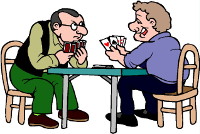| TABLE ETIQUETTE HELPFUL GUIDELINES |

Authorised Information (AI) is made available to you from the legal calls and legal cards played by your partner (and the opposition) - All other information you receive is Unauthorised Information (UI).
UI can come from partner's comments, gestures, mannerisms, breaks in tempo, hesitations, a question partner asks (or replies to), an alert, or an announcement. That is not to say all alerts/announcements are UI! but they can for example 'wake' you up to an 'error' call.
There isn't a social bridge player alive who hasn't at some time given out some form of UI. There are also those who are blissfully unaware that they are doing so (regularly) presumably confident in the knowledge that they're of honest and fair character.
Creating UI is NOT illegal, but acting upon UI given by partner IS. It is worth stressing that: It is a 'given' that UI is made unintentionally and similarly that it is acted upon likewise.
In the coming weeks, we will be trying to outline perhaps how each of us can improve our etiquette in bite-size simple guidelines.
..... see less
Authorised Information (AI) is made available to you from the legal calls and legal cards played by your partner (and the opposition) - All other information you receive is Unauthorised Information (UI).
UI can come from partner's comments, gestures, mannerisms, breaks in tempo, hesitations, a question partner asks (or replies to), an alert, or an announcement. ..........
..... see more |
|
|
|
| AVOIDING UI PART 1 |

Avoiding Trouble, Part 1. The best way to deal with Unauthorised Information (UI) is to try and minimise the instances of when it is transmitted. Below are a few points of helpful advice.
Refrain from verbal exclamations: Such as “I Don't know what to bid?” or huff, puff, sigh etc – you're unwittingly telling partner you have a problem.
Mentally have the call you want to make before reaching for the bidding box: Don't hover your hand over the Pass cards and then make a different bid or (similarly) hover over the 'bid' cards and then make a Pass – you're effectively announcing “I'm light for my bid” or “I almost have a bid”.
Do not ask questions needlessly: If you have no intention of bidding then wait until the opening lead to ask your questions. It has the added benefit of often speeding up proceedings and not giving your opponents potential UI.
Don't put unnecessary pressure on your partner by asking a question, then passing: Your opponents have made an Alerted Bid and you have length and values in that suit or have other good values, by all means (if needs be) ask for clarification and then for instance 'double' or 'cue-bid' or 'bid a suit' to say “'I have that suit' or “some other agreed meaning'” - far better than passing, which could limit partners bidding options when holding marginal hands.
Please Note: As a club, we very much value the social aspect of the game (club bridge is meant to be fun and not oppressive) and this series is in no way meant to make your evening more officious than needs be – the underlying reason for these guidelines is to enhance your enjoyment (and others) and to be as fair as practicable.
More, in the next instalment
..... see less
Avoiding Trouble, Part 1. The best way to deal with Unauthorised Information (UI) is to try and minimise the instances of when it is transmitted. Below are a few points of helpful advice.
Refrain from ..........
..... see more |
|
|
|
| AVOIDING UI PART 2 |

Avoiding Trouble, Part 2. Following on from Part 1. A few more points.
Do not offer explanations, unless asked: Partner makes an unusual call (cue-bid for example) – don't wave your alert card and then announce “I'm alerting it, but I don't know what it means”.
NB: It's perfectly reasonable not to know what a bid means (even if known to be not natural/normal) and you can say as much if asked. But bear in mind it's far worse to say “I don't know, but I'm taking it as..xyz”. Better to say “I don't know, would you like to know what I think it means?” and as a free piece of advice in reply, it's usually best to say “No, that's OK, tell me at the end of the auction”.
Refrain from making eye contact with your partner during bidding and play: It's not good form to make a conventional bid and then stare across the table willing partner to take notice or similarly glower/tut because they haven't led back your suit.
Incorrect Information 1: When questioned. If partner explains a call that you have made and answers incorrect to your agreements, you are NOT allowed to know that they have 'forgotten the system' - You should act as though you are not in receipt of that information. This is admittedly a very tough thing to do but it's the ethical way to act.
Incorrect Information 2: Similarly if this time you have 'messed up', but your convention card and partner has given the correct explanation. You are not permitted to convey to partner that you have made an error or re-adjust your 'course' having learned of your error (during the bidding/play of the hand).
Discussing hands just after you've played them. It's generally not right to be discussing hands 'in detail' at the table: “Well if I'd known trumps were to break 4-1 I'd have made it” or “Making six! and we've only 29 HCPs” - these sort of statements can often be said louder than thought and within earshot of where the boards are heading next.
Just wanting to underline previous sentiments: Although UI isn't commonplace within our club, it has been noticed and commented upon by a number of members. It should be understood that there's no pointing of fingers as we have all been guilty of it at one time or other. The last installment coming shortly.
..... see less
Avoiding Trouble, Part 2. Following on from Part 1. A few more points.
Do not offer explanations, unless asked: Partner makes an unusual call (cue-bid for example) – don't wave your alert card and the ..........
..... see more |
|
|
|
| AVOIDING UI PART 3 |

Avoiding Trouble, Part 3. The final instalment of the UI and Table Etiquette series.
In Tempo Care when making limit bids: Generally speaking limit bids shouldn't take that much thought by the virtue that they're 'limited'. Typical limit bids: Opening 1NT or 2NT, showing support of partners opening bids, inviting game over partners 1NT opening. Being 'Out of tempo' is more frowned upon if you 'turn up' without the normal agreement e.g. only 3 cards when promising 4 card support or HCPs outside your agreed range. NB: It's perfectly acceptable to be outside of what your normal agreements are, but they shouldn't be highlighted by any kind of UI.
Do not get caught 'thinking'. The law states a player should be particularly careful when variations in tempo may work to the benefit of their side. To pause intentionally in order to lead your opponent astray is illegal/unethical: If there's a 'finesse-able option' in dummy and you're sitting under with just low numbered spot cards, it looks unfavourable if you're out of tempo whilst deciding which of your cards to play. Obviously, there will be times when it's necessary to give a problem thought, but try eliminating those when there's nothing to think about – as much as possible plan ahead as to what you're going to play in relation to dummy's cards.
Be careful as to how you word your questions: It's generally bad to say “You didn't alert the 3C bid, is it natural? Or “You alerted the 2D .... so it says nothing about diamonds?” - you could in effect be saying to your partner "I have that suit". Better to assume that if not alerted then all bids are natural (and vice versa), if that is not the case, you could be 'damaged' and will have cause to reserve your rights.
A common myth is: If there is hesitation during the auction then partner is silenced for the rest of the auction. Hogwash. There could be possible scrutiny at the end of the hand (in the presence of the Club Director) as to whether Partner 'had' their bid and weren't acting on UI, but it certainly is not illegal to act over partner's hesitation.
Have a convention card outlining your agreements and making them readily available to your opponents. Apart from being a source of information for your opponents perhaps quenching the need for questions, it is also a good safeguard when dealing with disputes.
Have just one board on the table. Nothing to do with UI, this is more useful in terms of table etiquette: Should the movement be called and your table is still playing – the first board can be taken from the side table and passed to the waiting table without disturbing play.
Hopefully, this series has been beneficial and that we've all learned something which we can apply to our game. Happy Bridge.
..... see less
Avoiding Trouble, Part 3. The final instalment of the UI and Table Etiquette series.
In Tempo Care when making limit bids: Generally speaking limit bids shouldn't take that much thought by the virtue that they're 'limited'. Typical limit bids: Opening 1NT or 2NT, showing support of partners opening bids, inviting game over partners 1NT opening. ..........
..... see more |
|
|
|